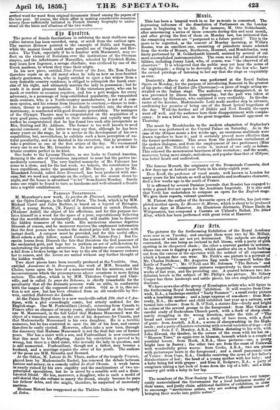lilusir.
This has been a languid week in so far as music is concerned. The depressing influence of the dissolution of Parliament on the Landow season is beginning to ho felt. For instance, M. Otto Goldsehmidt, after announcing a series of three concerts during this and next month, and after giving the first of them on Monday last, has intimated that the remaining concerts are "postponed to a future period." This is the more to be regretted, as the concert of Monday morning, at Willis's Rooms, was an excellent one, consisting of pianoforte music selected from the works of Mozart, Beethoven, Hummel, and Dfendelasolin, very finely performed by M. Goldsohmidt himself, assisted by several of our most accomplished instrumentalists. The room was full of musical note, bilities, including Jenny Lind, who, of course, was the observed of all observers." It is whispered that the public may yet hear the notes of the nightingale • a thing to be devoutly wished, for the few who have the envied privilege of listening to her say that she sings as exquisitely as ever.
Donizetti's Maria di Behan was performed at the Royal Italian Opera on Monday, for the purpose of introducing Romani in the greatest of his parts—that of Enrico (De Chevreuae)—a piece of tragic acting un- rivalled on the Italian stage. The audience were disappointed, as he was prevented by illness from appearing; but the part was taken at short notice by Debassini who sustained it very creditably. In the cha- racter of the heroine, Mademoiselle Lotti made another step in advance, confirming her promise of being one of the finest lyrical tragedians of the day. With the further aid of Didiee and Nen Beraldi the opera went off well, and the audience bore their disappointment with compla- cency. It was a brief one, as the great tragedian himself appeared on Thursday.
The music by Mendelssohn to the modern adaptation of Sophoeles's Antigone was performed at the Crystal Palace on Saturday. As in the case of the CEdspue music a few weeks ago, an enormous multitude were drawn together to hear it; and it certainly pros ed more effective than the former performance. This arose from the judicious curtailment of the spoken dialogue, and from the employment of two performers (Miss Heraud and Mr. Nicholls) to recite it, instead of one only as before., This relieved the monotonous heaviness of the recitation; and the music, moreover, being more simple, melodious, and popular than that of Tdiptss, was better heard and understood.


























 Previous page
Previous page